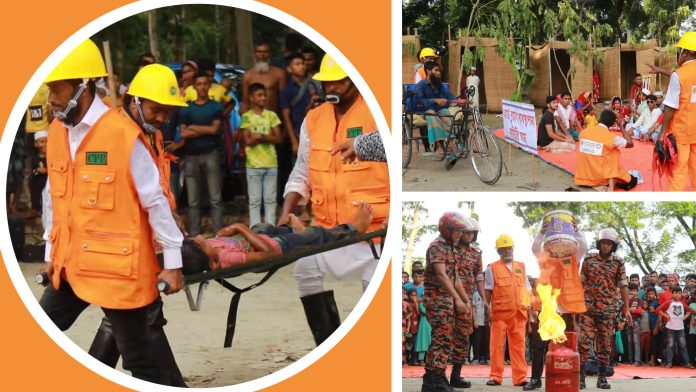Ayesha was thrilled to see how the firefighters fought with their skills and techniques to rescue two children inside a house that caught fire. She also came to know about the emergency numbers to call for help during a disaster. Ayesha Begum, 27, just observed a mock drill on disaster risk management, which was a first-of-its-kind experience for her and many others in her community.
‘Now I know how to stop a cylinder gas fire with a bucket of water and sacks. Watching the mock drills, I have learnt some new techniques to tackle a disaster,’ said Ayesha, after observing a mock drill organised by the Union Disaster Management Committee (UDMC) in Velumia union of Bhola district with fund support from the PPEPP-EU project.
Extreme poor people are the most vulnerable to disaster events such as cyclones, floods, and fires. Therefore, it is crucial to create awareness of disaster risk management and help them prepare to tackle such hazardous events.
To this end, PPEPP-EU is funding a series of mock drills on disaster preparedness mechanisms through hands-on, real-time exercises in its coastal working areas. Last year, a similar mock drill on disaster preparedness (on cyclones and firefighting) was organised by the UDMC in Satkhira’s Munshiganj union.
The mock drills are organised to better inform the community as well as the government and non-government organisations about their responsibilities in reducing disaster risk and capacitate them to perform their roles before, during, and after the disaster.
Md. Salahuddin (25) is a person with a disability and the son of a PPEPP-EU member, Amena Begum, who participated in the mock drill session in Velumia. He shared, ‘By attending the mock drill, I realised the importance of awareness-raising announcements on disaster preparedness, moving to a safe shelter before a cyclone or tornado and accessing necessary first aid after the event. Also, I learned how to keep calm in the face of a disaster.’
The mock drill exercises are participated by a group of related stakeholders, which includes the Upazila administration, Upazila Social Welfare Office, Community Clinic, Fire Service and Civil Defense, Cyclone Preparedness Program (CPP), Project Implementation Officer (PIO), Village Police, teachers, students and religious leaders.
Extreme poor people from different intersectional groups living in the coastal areas, such as persons with disabilities, elderly persons, widows and children, observed the two and a half hours of mock drill sessions.


